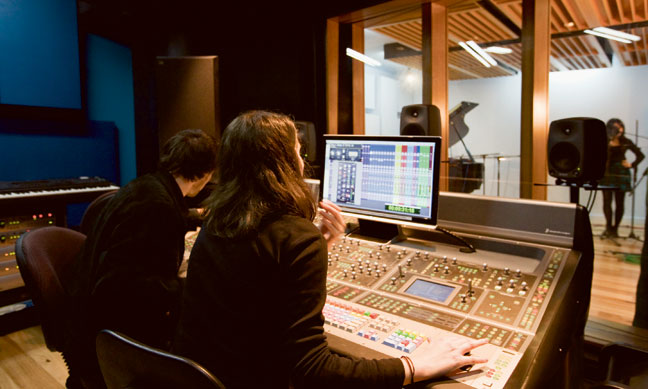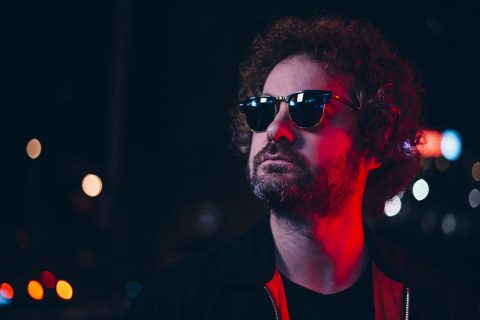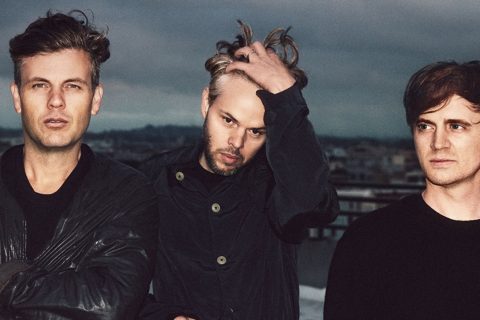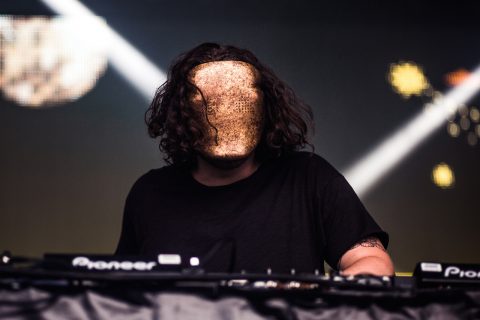
To help gain an understanding of the different outcomes of paid vs unpaid dance music education, we continue on our discussion with the help of current AIM student Lucas O’Loughlin as well as course coordinator Patrick Nellestein who has curated and teaches the Bachelor of Music (Composition & Music Production) degree.
Patrick Nellestein has been composing and producing music for over 15 years, primarily focusing on music for Film and TV. Credits include theme for Channel 10’s ‘The Project’ with the AIM course coordinator emphasising ‘my composition approach is to blend acoustic sounds with electronic and synthesised sounds.’
Patrick tends to utilise processed electric guitars, acoustically recorded pianos, with synthesised sounds to create various timbres, structures, and textures. Other teachers in the Composition and Music Production course include Eric Chapus (aka Endorphin), Simon Caldwell (long standing MOS signed DJ, radio host and mean party thrower), and Nick Toth (long standing hip-hop DJ, radio host and more).
The discussion is simple on the surface, to pay or not to pay? Will studying give you the foot up and wire frame to get ahead or will logging the extra hours in your own time bring forth those intricate beats? Patrick, a man with the experience, knowledge and teacher to those willing to learn lays it out for us.
You could say there is a debate currently at hand discussing the merits of paid education versus the ‘lab coat’ path of experimenting yourself. How do they differ?
Currently we are experiencing a shift in learning methods, by where music courses are balancing the merits of both paid education, and experimenting yourself. The modern learning environment enables students to experiment, create, and interact with the teacher and the content; within their chosen domain. The option to learn about music and creativity with an expert in their field, (such as the teachers in our Composition and Music Production course at AIM), do we see students thrive and achieve the necessary skills to exceed in their field.
Would you be able to go on step further and explain the pro’s and con’s of each?
Formal education provides a strategically designed course, in which the student receives a balanced education of creative and technical skills, with leading Electronic artists, composers, DJs, Film composers, songwriters, etc. Experimenting your self does not provide this. Experimenting yourself is basically free, but the longevity and investment into formal education does provide the necessary skills and outcomes required to work in a very competitive and evolving industry.
What one module from the course do you really think students enjoy or benefit the most from and why?
The Composition stream, provides students the opportunity to follow their own creative pathway. While learning the principles and techniques of Composition and Music Production, they are exploring them in their own domain, such as Electronic Music. Be that understanding harmony, structure, or texture, they can practice these principles with their own tools, software, and instruments; ultimately we see student develop their own sound, and creative identity.
What kind of feedback do you get from students who have finished the composition & music production course?
The main feedback at Graduation, is how innovative they have become; and having the ability to work in professional and creative environments. We also see a high level of confidence and motivation in what they do, as they enter a very competitive industry, they know they have what it takes to compete. Towards the end, and at the completion of the course, we are seeing many students function at a very high level, in an array of creative projects and endeavours.
What makes you enjoy your job so much?
I love the learning environment of the Composition and Music Production course. Every day I am converging with a number of very creative and innovative students and teachers. The course design feature of my job definitely has its merits, such as seeing a student apply and develop their own techniques and creative identity throughout the course. It is also great to be part of a department which is looking to the future of the Composition and Music Production industry.
Could you please give us a short overview of the Bachelor of Music (Composition & Music Production)
The major study Composition and Music Production course, contains three major streams:
– Composition: Composition focuses on creativity, and the processes and techniques required to transform an idea into a structure piece of music.
– Music Production: Music Production explores how to produce a piece of music, and how to transform an idea into a high quality track.
– Digital Technology: Digital Technology exposes the student to the most current tools and processes being utilised in Creative Music Production.
In these streams, students can follow their chosen field or industry, such as Electronic Music, DJ, instrumental composition, sound for interactive media, songwriting, and music for Film and TV.
Simply put, education helps students understand the tools they have and how to use and manipulate them. You can still add that creative flair to anything but knowing how to knock over steps 1 and 2 could help you get ahead. That and the ability to work in a commercial sense means not having to slave away at that job you have but use and practice your skills each and every day. Killer combo!





Comments